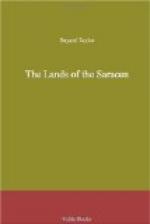to enter the mosque, or even its enclosure, on penalty
of death, and even the firman of the Sultan has failed
to obtain admission for a Frank. I have been
strongly tempted to make the attempt in my Egyptian
dress, which happens to resemble that of a mollah
or Moslem priest, but the Dervishes in the adjoining
college have sharp eyes, and my pronunciation of Arabic
would betray me in case I was accosted. I even
went so far as to buy a string of the large beads
usually carried by a mollah, but unluckily I do not
know the Moslem form of prayer, or I might carry out
the plan under the guise of religious abstraction.
This morning we succeeded in getting a nearer view
of the mosque from the roof of the Governor’s
palace. Francois, by assuming the character of
a Turkish
cawass, gained us admission.
The roof overlooks the entire enclosure of the Haram,
and gives a complete view of the exterior of the mosque
and the paved court surrounding it. There is
no regularity in the style of the buildings in the
enclosure, but the general effect is highly picturesque.
The great dome of the mosque is the grandest in all
the Orient, but the body of the edifice, made to resemble
an octagonal tent, and covered with blue and white
tiles, is not high enough to do it justice. The
first court is paved with marble, and has four porticoes,
each of five light Saracenic arches, opening into
the green park, which occupies the rest of the terrace.
This park is studded with cypress and fig trees, and
dotted all over with the tombs of shekhs. As
we were looking down on the spacious area, behold!
who should come along but Shekh Mohammed Senoosee,
the holy man of Timbuctoo, who had laid off his scarlet
robe and donned a green one. I called down to
him, whereupon he looked up and recognised us.
For this reason I regret our departure from Jerusalem,
as I am sure a little persuasion would induce the
holy man to accompany me within the mosque.
We leave to-morrow for Damascus, by way of Nazareth
and Tiberius. My original plan was to have gone
to Djerash, the ancient Geraza, in the land of Gilead,
and thence to Bozrah, in Djebel Hauaran. But Djebel
Adjeloun, as the country about Djerash is called,
is under a powerful Bedouin shekh, named Abd-el Azeez,
and without an escort from him, which involves considerable
delay and a fee of $150, it would be impossible to
make the journey. We are therefore restricted
to the ordinary route, and in case we should meet
with any difficulty by the way, Mr. Smith, the American
Consul, who is now here, has kindly procured us a firman
from the Pasha of Jerusalem. All the travellers
here are making preparations to leave, but there are
still two parties in the Desert.
Chapter VI.
The Hill-Country of Palestine.




